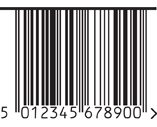Last week I wrote that sellers are failing to complete the Product Identifiers that eBay are requesting (and in some categories, insisting) they add to their listings.
Many of you have told us in no uncertain terms that you don’t like the mandate so today we’re highlighting some of the issues you see.
Why Tamebay readers aren’t completing eBay Product Identifiers
You simply don’t have the time
It takes time to add information when listing on eBay and adding Product Identifiers is not a trivial requirement. Sure you probably have the Brand and perhaps the Manufacturer’s Part Number (MPN) to hand, but finding the GTIN (EAN or UPC) isn’t always easy. Manufacturers don’t always display GTINs on their own websites or on the product. You could well end up searching the web for a GTIN for each and every product you list.
The product data doesn’t exist
Some manufacturers are simply not implementing GTINs or MPNs correctly. They may use a single GTIN and MPN for a product in a range of colours and sizes instead of applying one to each individual variant.
Other manufacturers reuse GTINs, once this season’s stock is all sold they’ll recycle the GTIN for next seasons products.
More work needs to be done by manufacturers to ensure that each individual product really does have unique product identifiers if eBay sellers are to have any chance of pleasing eBay.
Buyers won’t search for GTINs
When was the last time you searched on eBay (or any website) for a GTIN? Probably never. The only time you may have performed a GTIN search is if you’re in a physical store and do a bar code can for price comparison.
Literally no one knows what GTINs are, any more than you know Tamebay’s IP address. We’re humans, we don’t like long numbers, we like words and very much prefer to type channelx.world rather than a number such as 213.219.36.171 and it’s the same when it comes to products.
You don’t want price comparisons
You’ve taken superb product shots which catch a buyer’s eye in search results. You’ve written your own enticing description instead of cutting and pasting a boring manufacturer specification. You’ve driven traffic to your eBay listing with tools like eBay Shop email marketing, Markdown Manager, Sales and price promotions. You’ve built up a fantastic sales history which means your listing is now at the top of eBay search results.
Why do you know want to add a GTIN to make it really easy for a buyer to find a competitors listing and price compare, possibly buying from an alternative seller as they’re a couple of pence cheaper?
You don’t like reviews
If your listing doesn’t have a GTIN then eBay can’t assign reviews to it. You’re telling us that one bad review can ruin a listing’s sales and of course the review may not be for an item you’ve sold. It might be for an identical product sold by a less scrupulous competitor which wasn’t all it should be. If a competitor sells a dodgy refurb which gets a bad review, you don’t want that appearing against your listings and potentially damaging your own sales.
Equally some readers are concerned that competitors with similar products might simply drop a bad review against your product, in the same way that in the past some sellers worried their competitors would buy from them simply to leave a negative feedback.
So what’s different to Amazon?
We all know the reasons why eBay want product identifiers. They want to catalogue products, ensure that they can appear on Google, compare identical items so that they can surface the best deals to buyers, add reviews as we all know that user generated content is even better Google bait. But sellers still have a myriad of reasons for not complying.
If all the above issues are valid on eBay, how come Amazon sellers are so successful? On Amazon everything is catalogued and assigned an ASIN. All sellers on a single product list against a single product detail page so any bad reviews affect everyone and there’s total transparency on price between different seller’s offers.
Sure there are a handful of sellers on Amazon who try to play the game and create their own ASIN instead of competing with other sellers. Amazon will soon put a stop to sellers trying to cheat by insisting that every ASIN has a valid GS1 GTIN.
Will it make any difference anyway?
We know that eBay suffered a Google penalty for semi-hidden landing pages tailored purely for SEO. eBay are now trying to rebuild their SEO rankings and at the same time catalogue products for eBay’s own search engine. Will editing your listings to add product data make the slightest bit of difference to their SEO efforts?
Sure there are some products (like mobile phones) where comparisons are so easy that catalogue listings make sense. But if you’re selling an own branded unique item, will having a GTIN or MPN really make any difference?
What’s eBay to do?
eBay need to boost their search engine visibility and surface the best deals in search for their buyers. You want to make your listing outperform your competitors listing even if it hurts eBay’s more general search engine optimisation.
So I’m genuinely interested in your views and what you think eBay should do. Would it be better if eBay went do the road of fully catalogued listings with product data already completed in the style of Amazon with one listing, set of reviews and product data for each item. Alternatively do you like the status quo where you can differentiate your listing from competitors and, if not today at least at some point in the future, are you willing to add product data to increase off-eBay SEO?











10 Responses
we would like ebay to have a reliable and efficient search engine that simply used the title as its main finding data
treating google as an added extra not an essential
Ebay offers something different to amazon and that’s the appeal to me. Catalogued listing style is seriously an issue with incorrect product data, price matching software, only selling if you are the cheapest irelevant if your level of service is that much better than your competitors, boring uniformed catalogue pages, list is endless.
Ebay we can create our own brand and listing style and our selling reputation is clear to see,
being honest a lot of products we don’t bother selling on amazon anymore because firstly we aren’t giving them away for next to nothing, and secondly the incorrect catalogued data causes no end of issues especially when amazon come down heavy on retailers for selling something apparently inauthentic due to another seller changing the product page,
I was surprised when they brought this in
It needed to happen years ago if this was the strategy but Amazon ran with it and developed it
EBays usp is it’s not amazon, you can list anything without Needing all the barcodes and have your own brand, products and stylised listings etc.
Why should sellers spend time and money on it when the ultimate outcome is going to be it shows the same item cheaper from another seller?
Arguably this wouldn’t be necessary if eBay hadn’t fallen out with Google and had a worthy search engine, and if the site wasn’t flooded with duplicate listings from Asian businesses both abroad and in the UK.
We are being made to pay for their seo mistakes and I think small businesses would perhaps be better investing their time and money elsewhere
What should eBay do?
Scrap Cassini search and level the playing field. Give all sellers equal visibility and a proper search engine, stop trying to preempt what buyers want and let them search organically.
There is too much anecdotal evidence that sales and visibility are manipulated, throttled, rolling blackouts, whatever you want to call it.
The problem is eBay have too many listings but not sure cassini and barcodes are the answer. Sellers can’t afford time to do more work for eBay without sales
There’s an underlying issue here between sellers and Ebay, that goes way beyond Product Identifiers.
This is just the latest hoop Ebay wants sellers to jump through, but there is a history of broken trust.
If you look back at the things Ebay have introduced, usually without consulting sellers, these have mostly created real problems for sellers without any help or tools from Ebay to assist them.
I’ve lost count of the times we had to edit 50,000 plus items of several weeks, to change pictures (which Ebay’s own picture service shrank below 500 pixels). Or to add or remove postage and/or item specifics details. The list goes on and on.
There is no doubt that making it easier for buyers to buy items is a good thing.
The problem is the constant changing by Ebay and complete lack of support for sellers when they decide to make changes, the benefit of which is often dubious anyway.
What is needed at Ebay is to have some successful Ebay sellers in the boardroom.
People who are customer focussed and make money, but who can give the sellers’ perspective on things.
Sellers pay for everything on Ebay, but get no say in what goes on and are expected to accept everything thrown at them.
Any changes in Ts&Cs on Ebay is accompanied by a “click here” button if you have questions or are not happy with any changes.
It takes you through to a Close My Account page.
Says everything you need to know about Ebay’s attitude to sellers.
Is seller reaction to Ebay initiatives therefore any surprise?
I can add one more reason why I don’t like them and that is protecting your supplier details. Yes, some items are readily available but there are some items you search long and hard for sources and putting the MPN or what-not for all to see just lets all your competitors see where you got it.
I don’t think it can be compared to Amazon because they did this from the start. Amazon have basic requirements to create a listing and they’ve not changed much in years.
eBay on the other hand introduce changes every few months that require revision of listings en masse, with promises of better visibility. I think a lot of sellers are just fed up of constantly having to revise their listings just to keep up., with little or no benefit.
I’m sure if Amazon introduced a retrospective change that required sellers to revise all their inventory, sellers would be equally reluctant (although it’s a safe bet Amazon would have a tool that would work far better for the job).
Again, ebay expect the Sellers to do the work. If they want eans, then lets have an ebay database which will automatically find it from the product title. That of ciourse wont happen, and if it did, it would be like the ebay Catalgue..years on, still full of errors not fit for purpose. Its time for a shift in thinking at ebay; ebay should pay us to list, its just a nightmare